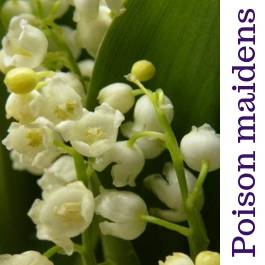Poison maidens occur in Indian folklore, where they are called visha kanya. They are assassins. Perhaps they are based on a real tradition of women taught to seduce and then poison the men to whom they are sent as gifts, but that seems almost entirely theoretical. In the more developed form, the maidens are raised around poisonous things, or being tiny amounts of poison, so that their bodily fluids become toxic. In the most dangerous forms, even their touch can kill.
The story first leaps the the West in the Gesta Romanorum, which was a wildly popular collection of stories form the late 13th Century, the contents of which you’ve seen recycled in all sorts of later authors. It seems like a worthwhile subject for a series of episodes. Richard Burton worked this into a story about a woman sent to Alexander the Great. Nigel Hawthorne (whose Twice-Told Tales may have something to do with the Ars supplement Thrice-Told Tales) used Burton as a source for his short story, “Rappacini’s Daughter”. In that story an alchemist makes his daughter, Beatrice, a poison maiden. He then experiments on a neighbouring young man named Giovanni, giving him the same properties. The experiment seems to take the form of mere proximity: it’s transmitted merely by either being in the presence of the poison maiden for an extended time, or perhaps it is caused by their walks occurring in a garden of toxic alchemically-hybridised flowers.
Beatrice knows she is a poison maiden, but not that she can transfer her curse, so she avoids contact with Giovanni. She appears to think that the touch even of her clothes can cause harm. She grabs his hand at one point, to stop him touching her “sister”, which is what she calls the tree that sprouted at her birth. It is fatal, so he intervention is necessary, but her fingerprints become vivid bruises on her beau’s wrist. Giovanni sends Betrice flowers from outside the poison garden, but her breath makes them wither. Giovanni discovers he has become like Beatrice when his breath kills a spider. As a spoiler, Beatracie’s nature has been so reversed that when she takes a sort of universal purgative to remove her poisonous nature, it kills her instead of healing her.
The Poison Maidens seem like a class of Transformed Human, but Beatrice, at least appears not to be a magical creature. She may be a human, but if so, she’s a Companion, simply because she needs a vast number of Virtues and Flaws for her construction. We might, instead, suggest that Rappacinni is a Mystogogue and has invested his daughter as she grew, so she has more virtues than is usual for player characters. Giovanni’s development of the curse seems to suggest this is an incorrect interpretation. A simpler alternative is that the garden he has created, filled with alchemichally spliced plants, is a mystical space which warps the people who enter it, granting them the flaws required.
Here are some Virtue and Flaw packs to create various versions of the poison damsel.
Legendary Assassin
Virtues
Greater Power: Fluids poisonous to the touch, CrAq 35: Init. (Qik-4), 0 points,
Create a poison that causes a fatal wound. (Ease 6)
CrAq25, +5 Touch, Special (as Momentary), Individual, +5 Ease 6.
Improved Power : reduces cost of power above to 0.
Lesser Immunity (Poison)
Flaw
Lesser Malediction (cannot benefit from medicines)
Fatal concubine
Virtues
Greater Power: Fluids poisonous to the touch, CrAq 30: Init. (Qik-4), 0 points,
Create a poison that causes a fatal wound. (Ease 6)
CrAq25, Personal, Special (as Momentary), Individual, +5 Ease 6.
Lesser Immunity (Poison)
Flaw
Lesser Malediction (cannot benefit from medicines)
Beatrice
Virtues
Personal Power: Poisonous touch and breath, CrAq15: Init constant, 0 points, CrAq 15 Create a poison that causes a Light Wound. (Ease 3). CrAq5, +5 Touch, Special (as Momentary), Individual, +5.
Improved Power: reduces cost of above to 0
Lesser Immunity (Poison)
Flaw
Lesser Malediction (cannot benefit from medicines)
Retiring creature
Virtue
Lesser Immunity (Poison)
Flaw
Greater Maledicition (killing touch – any of the above)
Lesser Malediction (cannot benefit from medicines)
